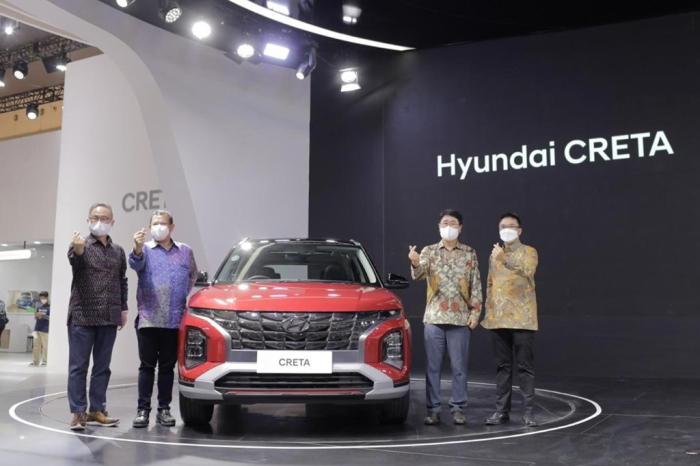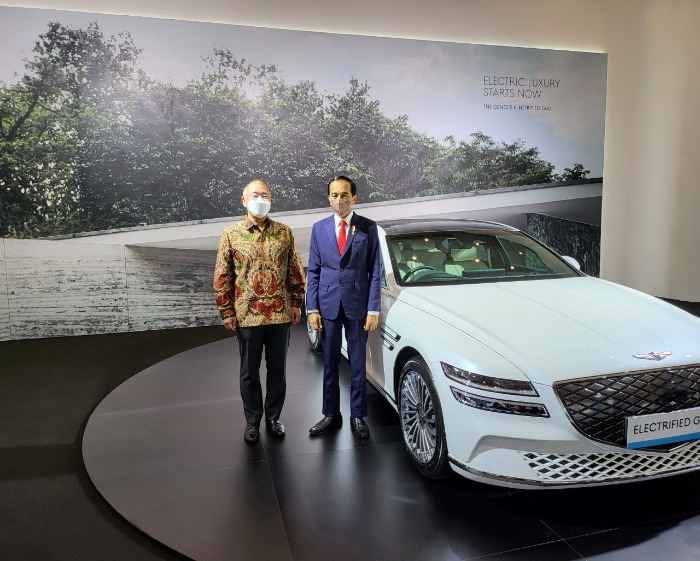Automobiles
Hyundai Motor Korea unit to manage Asia-Pacific markets
To target Southeast Asia with factory in Indonesia, starting with the Creta small SUV
By Dec 01, 2021 (Gmt+09:00)
3
Min read
Most Read
LG Chem to sell water filter business to Glenwood PE for $692 million


Kyobo Life poised to buy Japan’s SBI Group-owned savings bank


KT&G eyes overseas M&A after rejecting activist fund's offer


StockX in merger talks with Naver’s online reseller Kream


Mirae Asset to be named Korea Post’s core real estate fund operator



Hyundai Motor Co. is gearing up to manage the Asia-Pacific markets, excluding China and India, from its home office. South Korea's top carmaker aims to utilize the core manpower at its domestic business unit within its headquarters to compete against Toyota Motor Corp., the No. 1 player in Southeast Asia.
Hyundai plans to soon reshuffle the organization at its local business unit to expand its coverage to the Asia-Pacific, according to industry sources on Dec. 1. The company divides the global market into South Korea, the Americas, Europe, China, India, the Asia-Pacific and the Middle East. Each unit manages business in their respective regions including product strategies and sales. The Asia-Pacific unit currently controls Southeast Asia and Australia.
Through the reorganization, Hyundai’s South Korean business unit will be in charge of the Asia-Pacific region, while the company will continue to manage China and India separately, considering their market sizes.
“Hyundai appears to be taking aim at the Asia-Pacific markets with expertise at the core unit that oversees domestic businesses such as product and service planning and marketing as well as sales,” said an industry source.
Hyundai President & CEO Chang Jae-hoon, who had led the domestic business unit, was known to seek the reorganization as he aims to improve businesses in the Asia-Pacific with talented manpower who until now have been focusing on the stable local market.
The domestic business unit is also set to lead the company's reentry into Japan with electric vehicles and fuel cell electric vehicles.
“Executives told members of the domestic business unit to brush up on their English,” said a Hyundai official.
TO TARGET SOUTHEAST ASIA
Hyundai is focusing on Southeast Asia, given the strong growth potential in the region. Indonesia, the world's fourth-most populous country, is a high-potential market with about 1 million new units sold a year, with the current ratio of car ownership to total inhabitants standing at fewer than 100 cars per 1,000 people. The nation is a core strategic base for future vehicles as it is the world’s top producer of nickel, a key material for EV batteries, with the largest reserves.

Hyundai aims to become the No. 1 carmaker in Southeast Asia dominated by Japanese producers such as Toyota. Its exports to the region grew 33.9% to 80,725 units in the first 10 months of 2021 from a year earlier. Hyundai and its affiliate Kia Corp. have together held the top position in Vietnam since 2019, a market that had been ruled by Toyota in the 2000s. Hyundai became the No. 2 player last month in Australia, following the Japanese carmaker.
Hyundai recently completed the construction of a new factory in Indonesia with an annual capacity of 150,000 units. The plant is scheduled to begin mass production early next year with the small sport utility vehicle Creta, which will help Hyundai penetrate the local market with Japanese carmakers accounting for more than 95%.
Hyundai plans to produce and sell EVs customized for Southeast Asia. Indonesia, Thailand and Malaysia, each with an EV market share of less than 1%, all announced plans to boost EV sales, expanding subsidies and charging infrastructures.
Hyundai Motor Group has been extending its presence in the global market. Hyundai and Kia sold about 5 million units in the first three quarters, rising to become the global No. 3 player after the Toyota Group and the Volkswagen Group, according to automotive industry portal MarkLines Co. Last year, Hyundai Motor Group ranked No. 5.
Write to Hyung-Kyu Kim and Il-Gue Kim at khk@hankyung.com
Jongwoo Cheon edited this article.
More to Read
-

-
 AutomobilesHyundai to target Southeast Asia EV market from Indonesia
AutomobilesHyundai to target Southeast Asia EV market from IndonesiaOct 25, 2021 (Gmt+09:00)
2 Min read -
 EV batteriesHyundai, LG Energy break ground on $1.1 bn Indonesia battery plant
EV batteriesHyundai, LG Energy break ground on $1.1 bn Indonesia battery plantSep 15, 2021 (Gmt+09:00)
2 Min read -
 AutomobilesChinese, Korean carmakers penetrate Japanese-dominated Indonesia
AutomobilesChinese, Korean carmakers penetrate Japanese-dominated IndonesiaAug 30, 2021 (Gmt+09:00)
3 Min read -
 EV BatteriesHyundai Motor, LG Energy to build $1.1 bn EV battery plant in Indonesia
EV BatteriesHyundai Motor, LG Energy to build $1.1 bn EV battery plant in IndonesiaJul 29, 2021 (Gmt+09:00)
2 Min read
Comment 0
LOG IN


